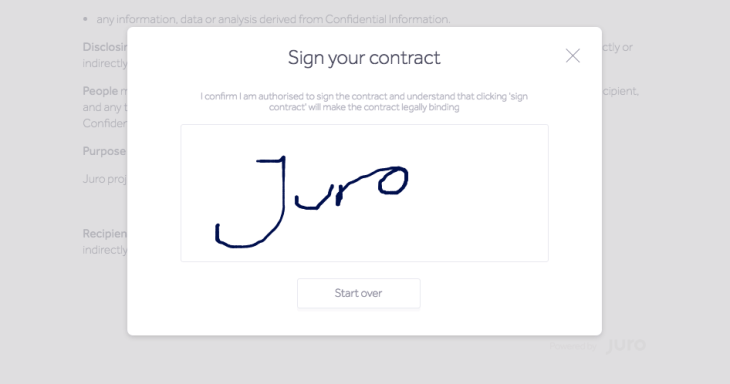London-based startup Juro, which is applying machine learning to help businesses speed up authoring and management of their sales contracts, has closed a $750,000 (£615k) seed round, with investors including Point Nine Capital and Seedcamp.
Also joining the round: angel investors Paul Forster (co-founder of Indeed.com) and Michael Pennington (co-founder of Gumtree).
Juro’s SaaS product is an integrated contracts workflow which it touts as a big time-saver, offering contract creation and e-signing capabilities while also enabling a newer set of features powered by machine learning tech — such as negotiation heatmaps and contract analytics — to help its b2b users identify recurring sticking points in contract negotiations, for example, and keep on top of renewals.
The core idea is to optimize and enhance a process that can still be pretty manual, with contracts being drawn up in Word and even printed and hand-signed, or turned into a PDF.
“Juro covers the entire end-to-end process around contracts,” says CEO and co-founder, Richard Mabey. “Our features help businesses author contracts, gain internal approvals, negotiate, sign, archive, track and manage contracts… And because we have all the contract data we are able to tell you how to make better decisions around contracts by showing actionable analytics.
“As part of this, our first application of machine learning helps to show patterns in negotiations. How do you know what to agree to? Which of your terms is most hotly negotiated? When do your contracts expire? We have the data to tell you.”
The team is also intending their machine learning tech to get smarter about being able to understand contract terms over time — to support more powerful features down the line.
“One application we are looking towards in the next version of Juro is a feature where you can throw in an NDA and the system will tell you (1) that the indemnity provision has not been agreed to in any other NDA, (2) that it merits further review and (3) that an indemnity would be off market in a case like that,” says Mabey.
“This will clearly take time, but it is exciting because it starts to automate the work traditionally done by in-house lawyers at very considerable cost,” he adds.
Juro’s main competition at this point are “large e-signing providers”, according to Mabey, which he argues only solve a minority of the “pain points” around contracts. “We are looking at the way in which the contracts are agreed in the first place, dealing with sales and internal legal teams.”
On the startup front, Mabey names the likes of Kira Systems, Luminance and Ravn as also applying machine learning to document review for use-cases like due diligence and selling to law firms.
“We are targeting marketplaces with a B2B element, mostly looking at sales contracts. That is, businesses with high volumes of contracts who spend a huge amount of time processing often thousands of sales contracts per year,” he adds, noting that Juro’s smallest customer processes 25 contracts per month and its largest in the region of 1,800.
The platform also integrates with existing business systems, such as CRM for contract generation and Slack for comment notifications.
The team launched the product in June, after gaining Seedcamp backing last February and running a private beta for several months. They now have around 1,000 businesses on their waiting list, with Mabey saying they are concentrating on a small number of “high volume players” while continuing to build out the product.
Deliveroo is one of the customers he says he can publicly disclose at this point, with the food delivery startup using Juro to power the “thousands” of contracts they have with restaurants.
What will Juro be using the new funding for? “We will use the capital (1) to grow our sales and customer success teams (2) to build out the data infrastructure necessary to capture the insights we want to show through analytics and (3) build a world class team of legal designers to deliver radically better UX than traditionally seen in legal services,” Mabey tells TechCrunch.
Point Nine Capital’s Christoph Janz, who has long been interested in e-signing’s business potential, adds: “One of the things that I love about Juro is that they are building an end-to-end solution that digitizes the entire process: from drafting a contract to negotiating and revising it, to signing it and to keeping track of the contract.”
“I do think that there’s a lot of demand for the ‘tracking’ part,” he adds, discussing one of Juro’s add-ons. “Without tracking key data such as notice periods and deadlines, for example, it can easily happen that you miss an important date e.g. for the termination of an agreement.”
